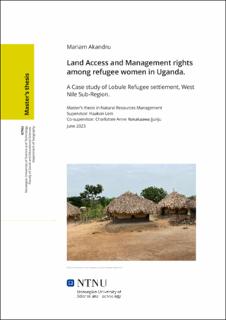| dc.description.abstract | Abstract
In Uganda, the Lobule Refugee Settlement is implementing an integrated development approach to refugee management. The approach aims to empower and create self-reliance among refugees. The Office of the Prime Minister (OPM) allocates land to refugees for their settlement and livelihood. The land is insufficient to sustain the refugees in their protracted situation, so they seek for land from the host community. Land rights are examined from historical, institutional, theoretical, conceptual, and social perspectives. This situates the study within current discourses about secure land rights for food security. The qualitative research aimed to investigate the social and institutional structures that affect refugee women's land access and management rights in Uganda. The study had three questions: what are the factors that influence land access, how do refugee women get access to and use of land and what are the implications of land access and management to refugee women in the host community? The individual, key informant, focus group interviews, and field observations generated the data, which was then analyzed using content analysis. The findings revealed that social interactions of refugee women with landowners determine their land rights. Their land access depends on the availability of cash or money that determines the size, and crops to be grown on the hired land. The organizations use the existing policies and laws to facilitate land access and management processes among refugee women. Refugee women experience some difficulties as they gain access to, use, and manage the hired land. These include inconsistencies in transactions by the customary landowners such as variation in the cost of hire. The uncertainty and duration in hiring land prevent refugee women from actively participating in sustainable land use and management practices. The majority of the interviewees proposed group farming as a method of improving food security. The study concludes that the Government and non-governmental organizations need to review the policies on land allocation to ensure arable land is provided or hired for refugees. Finally, the need to promote locally appropriate, and sustainable approaches to land use and management practices that will improve food security for the refugees and host communities. | |
